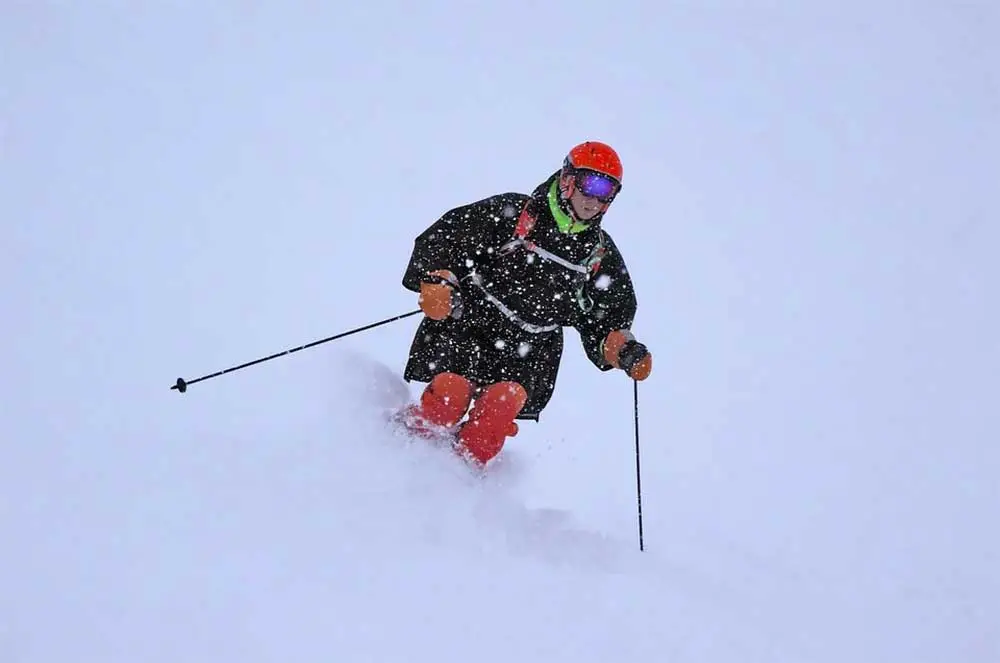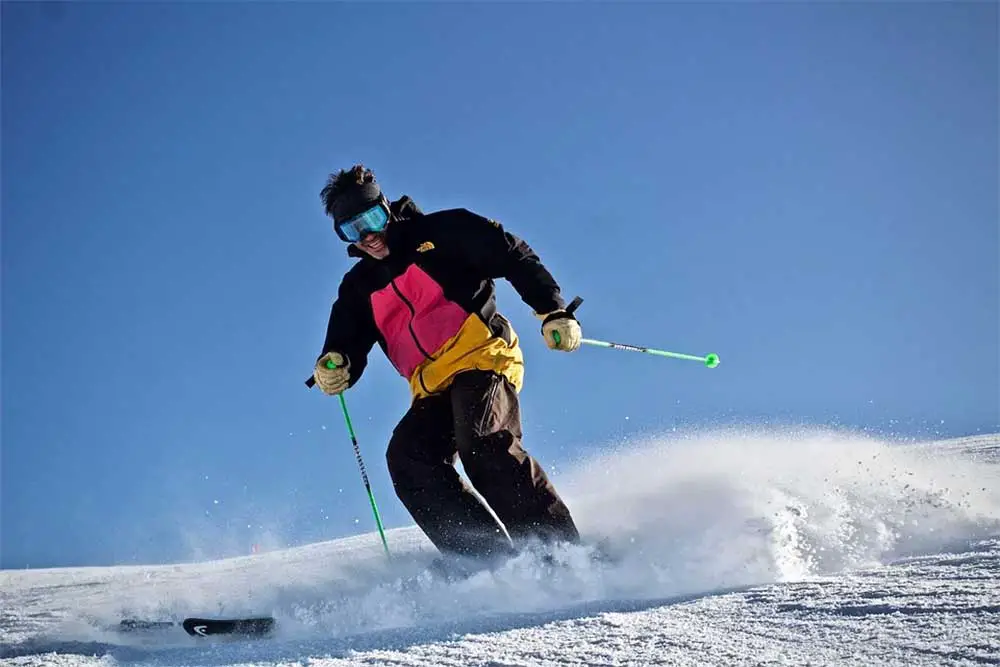Looking for a fun way to burn some calories? You don’t have to step on the treadmill to burn some serious fat. Instead, you can enjoy your next skiing trip with the knowledge that you can burn a huge amount of calories.
In just a mere hour of skiing, you can easily burn from 300 to 600 calories. Of course, you aren’t burning any of those calories when you stop for lunch or when you’re sitting on the chairlifts!
Of course, this can vary for a wide variety of reasons.

Here’s what we know for certain. You are certainly going to burn more calories when you are skiing than when you’re not. You’re not gonna burn many calories sitting down! The number of calories that you burn can be a little more complicated though.
For instance, the number of calories that you burn can depend on the kind of riding you’re doing, and it can also depend on you and your physical traits.
People that are older generally don’t tend to burn quite as many calories as those who are much younger and push themselves to the same level.
This is because your metabolism will get slower as you age, and older people don’t always push themselves to the same level as many young people will. We worry a little more about falling as we get older, and this can mean that we take it a little more easily.
Ultimately, if you want to lose a little bit of the weight that you’ve gained from eating a little too much Turkey at Thanksgiving, hopping onto your skis can be a good way to do that. With that in mind, here’s everything that you need to know about burning calories while hitting the slopes.
The Kind of Skiing That Burns More Calories
If you know anything about skiing, then you probably won’t be shocked to learn that you will burn the highest number of calories from cross country skiing.
For an elite cross country skier, for instance, burning more than 1300 calories each hour certainly isn’t out of the norm. You don’t have to be an elite skier to burn some serious calories though - if you’re doing some cross country skiing then you can still burn roughly 600 calories an hour.
Does Downhill Skiing Burn a Lot of Calories?
If you are an intermediate skier, then you should be able to burn anywhere from 300 to 600 calories per hour if you are skiing blue and red runs. Ultimately this can depend on a couple of things though, such as how hard you are skiing and your current weight.
People who weigh less don’t tend to burn as many calories since it doesn’t require as much effort for the muscles to hold up the weight of the body. In general, a man will usually burn roughly 500 calories an hour since they are heavier. A woman, on the other hand, will usually only burn around 400 calories per hour.
If you’re taking it easier on the slopes though, by just doing small turns when on the blues and taking longer lifts to the top, you are going to be burning a lot fewer calories. You can usually expect to burn around 200 to 400 calories each hour.
This ultimately depends on a couple of things though such as the weather and how much you’re wearing. You’ll burn more calories if you are colder since you are more likely to shiver.
Of course, you still need to be dressed up warmly when you are skiing - don’t shed layers for the sake of burning more calories!
Let’s be honest though - we all know that you’re reading this article because you want to enjoy plenty of food when you are on vacation. Are we right?
Should I Count My Calories When Skiing?
What you eat in the mountains stays in the mountain! In short, what we’re saying is to enjoy yourself.
Enjoy eating all of the calories that you want when you are skiing. Let’s put it this way. The normal adult will usually burn between 1500-2500 calories every day just from doing what they normally do.
If you’re doing around 4 hours of skiing at a moderate level on top of that, then you are going to be burning a lot more calories. As such, you can enjoy plenty of cheese, chocolate and anything else that you enjoy when you are on your skiing trip without feeling guilty!
What Are Calories?
Calories are listed on all sorts of different foods, and we all talk about burning calories. But what are they?
In reality, a calories is basically how much heat you need in order to raise a gram of water by one degree celsius. This isn’t strictly what we’re referring to when we talk about food though.
Instead, we’re talking about how much heat is needed to raise the temperature of a kilogram of water by just one degree. When people are talking about calories, they are talking about this - kilocalories. This is also what we’re referring to in this article.
They’re basically a measurement that can tell you how much energy there is in a food item. It’s telling you how much energy your body is going to burn and store. Think about it like putting fuel in a car - it’ll make it a little easier to understand.
What’s a Kilojoule?
Sometimes you will see something else on food packets - KJ. This means KiloJoules, and the measurements are usually much higher. They’re pretty similar to calories in many respects. It’s basically a conversion of calories. Basically, a calories is equal to 4.2 kilojoules.
How Many Calories Can I Eat To Maintain My Weight?

When you’re on holiday, you don’t want to be panicking too much about gaining weight. You want to enjoy your vacation, right? In general though, you can usually eat a lot of calories when vacation. You may need a calculator to figure it out though.
Joe Blogs burns around 2400 calories every day. In general then, he may be burning roughly 100 calories every hour. What about if you’re skiing? 4 hours of skiing when you are burning 500 calories would add up to an additional 2000 calories every day, you would think. Well, this assumption is incorrect.
Unfortunately, those calories that we’ve already mentioned will include the calories that you are already burning from merely existing. If you’re burning 500 calories an hour, then you’re simply getting 400 extra calories an hour that you can eat.
If you follow the example we have listed in the previous paragraph, then you’d be getting 1600 extra calories. It’s no small number, but it’s not as high as that 2000 that we assumed. You can enjoy plenty of extra foods with this number.
Of course, it’s important to moderate your diet. There are going to be some foods that contain a significant amount of extra calories in comparison to others. It can help to discuss the three macronutrients to illustrate this point - fats, proteins and carbs.
All of these nutrients are important, but you’ll get your quick energy bursts from carbohydrates. Protein’s role is to repair your muscles and it can help you to recover after exercise, so it’s important after an intense skiing session.
Fats are also important as they will help your body to absorb the important vitamins in food. They are essential, but you shouldn’t eat too much of any of these macronutrients.
You can’t expect to gain killer abs from one ski trip. Likewise, you’re not going to gain 100 pounds from your ski trip either.
When you are living and eating as normal, and you aren’t consuming any extra calories or burning too many extra, you are maintaining your weight. If you add a lot of skiing to the equation then you’re going to have a net negative effect on your calories. People in the fitness industry refer to this as a calorie deficit.
Ultimately, all weight loss comes down to this one key concept. If you are burning more calories than you consume, then you are in a calorie deficit. Your body will burn fat in order to survive, and this will result in weight loss.
Fats aren’t bad, however. They aren’t necessarily going to cause you to gain weight on your own - eating them in excess is just not great for your blood pressure or cholesterol.
The problem with high fat foods is usually that they contain significantly more calories per gram than what you would get in lean meats or vegetables. As such, you can’t eat as many of them in a day if you want to lose or maintain your weight.
A Recap and a Conclusion
Ultimately if you are skiing at a gentle pace, you’re going to be burning more calories than you would be if you were just sitting in front of your TV.
Kick your skiing sessions up a gear if you want to burn more calories. Make sure that you are working up a sweat!
Doing things like ski touring or cross country skiing can be particularly helpful for burning a lot of calories, as you may be able to burn as much as 1000 calories in just an hour.
If you’re trying to get a dessert or a nice meal, think about it based on your calorie expenditure. Consider how much of an impact it’s going to have on the following days before reaching for seconds.
In reality though, you’re enjoying a vacation. There’s nothing wrong with a little bit of indulgence when you’re away from home. It doesn’t mean that you’re going to drop a lot of weight by eating what you want on holiday though. Diet and exercise both play a huge role in weight loss.
If you’re going to be burning so many calories though, you may as well make the most of it and enjoy a little bit of dessert. You most likely won’t see any negative impacts from indulging a little when you are out in the mountains.
Enjoy your holiday, and don’t let calories get in the way of it. There’s time for calorie counting when you get home.
That's everything that you need to know about how many calories you are likely to burn in a skiing session! As you can see, it can vary depending on a lot of things, but even just a short skiing session can help to get your blood pumping. It’s a lot of fun too!
- Types of Skiing Terrains: A Comprehensive Guide for Every Skier - December 6, 2024
- Skiing Nutrition: Essential Nutritional Advice and Meal Planning for Skiers - August 15, 2024
- Backcountry Skiing Explained: Essential Tips and Gear - August 8, 2024








